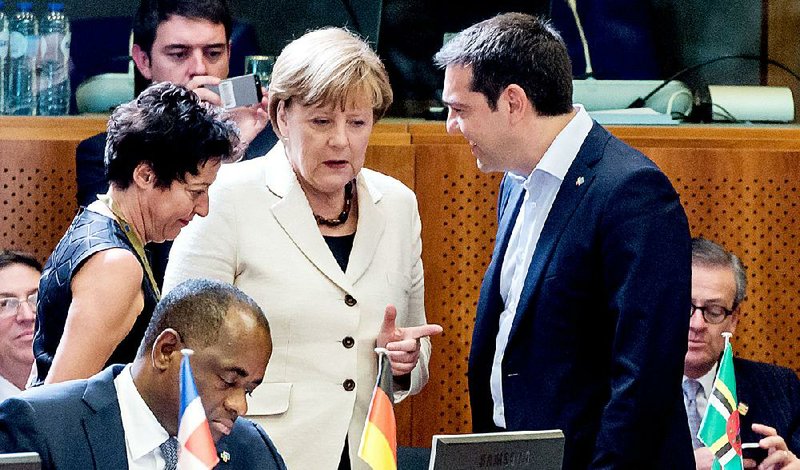BRUSSELS -- Greek Prime Minister Alexis Tsipras renewed his diplomatic offensive Wednesday to try to persuade European creditors to pay out the bailout loans the country needs to avoid default.
The creditors have made it clear that Greece has to improve its offer of economic changes before they release $8.1 billion the country needs to pay debts due at the end of the month.
Tsipras had a short meeting with European Union Commission President Jean-Claude Juncker late Wednesday, and they promised to continue talking today.
There was widespread expectation that Tsipras would also meet with German Chancellor Angela Merkel and French President Francois Hollande on the sidelines of a European Union-Latin America summit.
Wednesday's meeting came after Juncker's European Commission had said the offers made by Greece last week were still not good enough to unlock the bailout funds.
"For this final push, the commission is of the view that the ball is clearly now in the court of the Greek government," commission spokesman Margaritis Schinas said.
The lack of visible progress in the negotiations over the past weeks has revived fears that Greece could default on its debts and drop out of the euro, a move that would create widespread uncertainty for Europe and global markets.
"The goal is to keep Greece in the eurozone," Merkel said. "Where there is a will, there is a way."
Yet she insisted that it was up to Tsipras first and foremost to show that willingness.
Greece has three weeks left to conclude a deal with its creditors before its bailout program expires at the end of the month, when it will also have to repay about $1.8 billion to the International Monetary Fund.
Hollande also said he stood ready to meet with Tsipras if need be and stressed the importance of reaching a deal.
"We must be quick. We must not let things drag out," Hollande said.
The Greek government is at odds with its creditors over what changes Greece must make in return for the bailout loans. Each side has submitted its own proposals. But talks have been deadlocked since Athens rejected the creditors' suggestions as irrational Friday, saying they would make life harder for Greeks who have already faced five years of deep spending cuts and soaring unemployment.
Tsipras delivered a proposal to Juncker last week, which the government updated and sent to the European Union's economic affairs commissioner, Pierre Moscovici, on Monday. A Greek negotiating team has remained in Brussels for discussions.
Schinas said Moscovici had informed the government Tuesday afternoon "that their latest suggestions do not reflect the state of discussions" between the sides.
The European Commission's vice president, Vladis Dombrovskis, has said there is flexibility to replace certain measures proposed by the creditors with measures that have a similar impact on public finances, "especially in the areas of VAT [sales taxes] and pensions," Schinas said.
However, Dombrovskis has stressed the importance of agreeing on overall targets for Greece's primary surplus -- the budget excluding debt and interest payments. The Greek government has been arguing for lower primary surpluses than creditors demand, saying that insisting on high primary surpluses curtails the amount of funds that can be spent on the country and causes unnecessary hardship.
Tsipras' radical left Syriza party won elections in January on promises of repealing the harsh budget austerity measures that accompanied Greece's $300 billion bailout program.
With the country facing a severe cash crunch, he has agreed to make some concessions, although he insists that he will not cross certain "red lines," such as imposing further pension and salary cuts.
Tsipras must also face down hardliners within his own party, many of which have called for a break in relations with creditors and for Greece to go it alone, even if it means leaving the euro.
Information for this article was contributed by Sylvie Corbet and Geir Moulson of The Associated Press.
Business on 06/11/2015
